 Capitol Records released Glenn Campbell’s hit song, “Galveston,” on March 17, 1969 so we pulled out a version from the Lawrence Welk radio series, Guest Spot, show number LW70-36, distributed to radio stations as transcription discs. Guest Spot was one of many syndicated radio shows sponsored by the
Capitol Records released Glenn Campbell’s hit song, “Galveston,” on March 17, 1969 so we pulled out a version from the Lawrence Welk radio series, Guest Spot, show number LW70-36, distributed to radio stations as transcription discs. Guest Spot was one of many syndicated radio shows sponsored by the

United States Armed Forces, the U. S. Navy and Naval Reserves for this series.
The copy in the Southern Folklife Collection, call no. TR-12/504, is part of the extensive and always fascinating Eugene Earle Collection (#20376). Track list and liner notes are included to the left. The modulation in the last verse and the sound of the telecaster in the guitar solo where the string sounds so loose that it might fall off just gets us every time. The first clip below is the introduction to the show itself, the second is a sample of “Galveston.”
“Intro” Lawrence Welk–Guest Spot
“Galveston” by Glen Campbell
Category: Music
Two New Radio Streams: North Carolina and Memphis
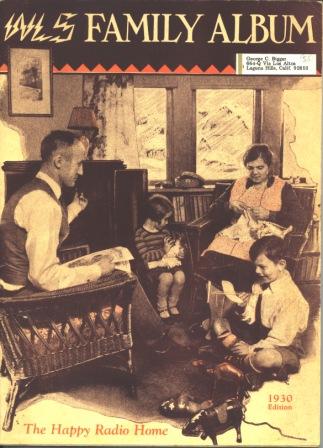 Continuing the musical tour of the South begun with our “New Orleans” stream, the Southern Folklife Collection presents two brand new radio streams:
Continuing the musical tour of the South begun with our “New Orleans” stream, the Southern Folklife Collection presents two brand new radio streams:
North Carolina, featuring the classic old-time, folk, and blues of our home state. Including tracks from North Carolina greats like Charlie Poole, Doc Watson, and many other musicians who have called NC home.
and
Memphis, featuring rockabilly, country, blues and R&B from the Sun and Stax labels, plus other Memphis-based country, blues and R&B classics.
Click links to listen (the streams work best with iTunes, Winamp, or VLC media players): you can always find the links at their permanent home at the “Streaming Radio” tab at the top of this page. The purpose of our radio stream is to make our holdings available for educational use. As always, happy listening!
Hank Cochran's "She's Got You"
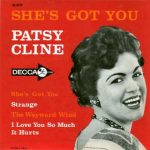 The late great singer-songwriter Hank Cochran penned many country hits over the course of a half-century long career in Nashville, including “Make The World Go Away” (for both Ray Price and Eddy Arnold) and “It’s Not Love (But It’s Not Bad)” (for Merle Haggard), but his most lasting contribution to the country songbook may have been “She’s Got You”, written specifically for Patsy Cline in 1961 as a follow-up to “I Fall to Pieces”, a song Cochran had written in collaboration with Harlan Howard.
The late great singer-songwriter Hank Cochran penned many country hits over the course of a half-century long career in Nashville, including “Make The World Go Away” (for both Ray Price and Eddy Arnold) and “It’s Not Love (But It’s Not Bad)” (for Merle Haggard), but his most lasting contribution to the country songbook may have been “She’s Got You”, written specifically for Patsy Cline in 1961 as a follow-up to “I Fall to Pieces”, a song Cochran had written in collaboration with Harlan Howard.
According to Mark Bego’s I Fall To Pieces: The Music And Life Of Patsy Cline, Cline had trouble completing her December 17, 1961 recording session “because she was so emotionally involved with the lyrics of ‘She’s Got You’ that she kept breaking down and sobbing in the middle of it.” Cline reportedly suffered a nervous breakdown the very next day, so it’s safe to assume she had some other issues at the time. Nonetheless, “She’s Got You” is sad enough one can certainly imagine it bringing a singer to tears.
PatsyClineClip
(clip from SFC CD-4761)
The song has since been covered by Dottie West, Loretta Lynn, and LeeAnn Rimes as well as by a number of male artists, who tended to change the initial pronoun in the interest of heteronormativity. A couple of the more recent variations come from singers more closely associated with British new wave and Mississippi rhythm and blues, respectively. Elvis Costello recorded a version for his 1981 country-themed album Almost Blue (clip from SFC CD-4826):
ElvisCostelloClip
And Little Milton included “He’s Got You” on 2000’s Feel It (clip from SFC CD-2520):
LittleMiltonClip
Tuli Kupferberg, 1923-2010
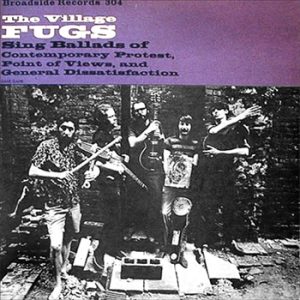 We were saddened to hear this morning that poet/musician/activist Tuli Kupferberg, one of the founding members of the folk-rock band the Fugs, died yesterday in Manhattan. He was 86 years old.
We were saddened to hear this morning that poet/musician/activist Tuli Kupferberg, one of the founding members of the folk-rock band the Fugs, died yesterday in Manhattan. He was 86 years old.
The Fugs released their first album, The Village Fugs (later reissued as The Fugs First Album), on Broadside and Folkways records in 1965. Fellow poet and founding member Ed Sanders wrote in1993,
We came to the attention of Folkways owner Moe Asch through the good efforts of legendary artist, filmmaker, and musical anthropologist Harry Smith… To float the project past Mr. Asch, Harry told him we were the Fugs Jug Band.”
While the Fugs remained largely unknown to mainstream audiences, the band had a lasting influence on popular music, introducing the explicit profanity, sexual references, and leftist politics that would later become a staple of punk rock. Kupferberg wrote many of the band’s funniest and most politically cutting songs, including “Kill for Peace” and “CIA Man” (recently featured in the soundtrack to the Coen Brothers’ movie Burn After Reading).
The SFC’s Broadside Collection contains many unreleased solo recordings Tuli Kupferberg made for Broadside in the 1970s, including the clip below, “Take-a-this-pizza”:
take-a-this-pizza
Clip from FT-9458 in the Broadside Collection.
This Land Is Your Land
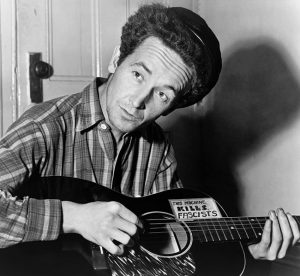 Happy birthday to the United States of America, an institution that turns 234 years old this week. Let’s celebrate with some clips of America’s favorite patriotic folk song, “This Land Is Your Land”.
Happy birthday to the United States of America, an institution that turns 234 years old this week. Let’s celebrate with some clips of America’s favorite patriotic folk song, “This Land Is Your Land”.
Here’s the first verse of Woody Guthrie’s original 1944 recording (a verse that would become the chorus in all future versions): Woody Guthrie
(clip from SFC CD-654, This Land Is Your Land: The Asch Recordings)
The “As I went walking that ribbon of highway” verse, as sung by Pete Seeger in 1958: PeteSeeger
(clip from SFC CD-2041, American Favorite Ballads)
The “I roamed and rambled” verse, by Lester Flatt and Earl Scruggs in 1962: FlattandScruggs
(clip from SFC FC-4520, Folk Songs of Our Land)
The “When the sun comes shining” verse, sung by Lee Greenwood (the guy who gave us “God Bless the USA”): Lee Greenwood
(clip from SFC CD-3650, American Patriot)
And North Carolina native Mojo Nixon puts a punk rock spin on the frequently dropped “Private Property” verse: MojoNixon2
(clip from SFC CD-1355, Root Hog or Die)
Mr. Garfield and Charles Guiteau
 On June 30th, 1882, the assassin Charles Guiteau was hanged in Washington, DC, almost a year to the day after his fatal shooting of President James A. Garfield. In March of 1949, North Carolina musician and folk song collector Bascom Lamar Lunsford traveled to Washington to record for the Library of Congress, and the many songs he recorded there included two topical ballads concerning the assassination of Garfield and execution of Guiteau. The epic narrative of the assassination “Mr. Garfield”, recorded on March 23rd, would later be popularized by Johnny Cash (you can watch him perform it on The Johnny Cash Show here). Lunsford introduces it:
On June 30th, 1882, the assassin Charles Guiteau was hanged in Washington, DC, almost a year to the day after his fatal shooting of President James A. Garfield. In March of 1949, North Carolina musician and folk song collector Bascom Lamar Lunsford traveled to Washington to record for the Library of Congress, and the many songs he recorded there included two topical ballads concerning the assassination of Garfield and execution of Guiteau. The epic narrative of the assassination “Mr. Garfield”, recorded on March 23rd, would later be popularized by Johnny Cash (you can watch him perform it on The Johnny Cash Show here). Lunsford introduces it:
I first heard it about 1903 when I visited the home of Mr. A.W. Williams, who lived on the edge of Henderson County, North Carolina… Anderson Williams, a young man, picked it and played it on the banjo… Once after I heard one stanza by another person. That’s the only two people I ever heard sing the song, besides myself.”
Mr. Garfield clip
The very next day Lunsford recorded a ballad sung from the perspective of the condemned man:
This is another assassination song, known as “Charles Guiteau”. I’ve known this all my life.”
CharlesGuiteau
Clips from Emrich Duncan’s Songs and Ballads of American History and the Assassination of Presidents (SFC FC-545 and CD-906).
Iry LeJeune Recordings Added to National Recording Registry
 The Library of Congress has named two recordings by Cajun accordionist and singer Iry LeJeune to the National Recording Registry. “Evangeline Special” and “Love Bridge Waltz” were both recorded for Goldband Records in 1948 and the original master tapes are housed in the SFC’s Goldband Records Collection.
The Library of Congress has named two recordings by Cajun accordionist and singer Iry LeJeune to the National Recording Registry. “Evangeline Special” and “Love Bridge Waltz” were both recorded for Goldband Records in 1948 and the original master tapes are housed in the SFC’s Goldband Records Collection.
From the Library of Congress press release:
“The post-World War II revival of traditional Cajun music began with accordionist Iry LeJeune’s first single, his influential recordings of “Evangeline Special” and “Love Bridge Waltz.” Le Jeune’s emotional and deeply personal style was immensely popular with Louisiana Cajuns returning home from the war, eager to hear their own music again. His recordings marked a distinct move away from the style influenced by Western Swing that had dominated commercial Cajun recordings for over a decade and a return to the older sound of Cajun music. This sound featured the accordion, prominently and unrestrained, and a blues-influenced singing in French. LeJeune is regarded as one of the best Cajun accordionists and singers of all time.”
Listen below to clips of both songs:
Evangeline Special clip
Love Bridge Waltz clip
Clips from SFC CD-713, The Legendary Iry Lejeune.
Photo of the Week: The Farr Brothers
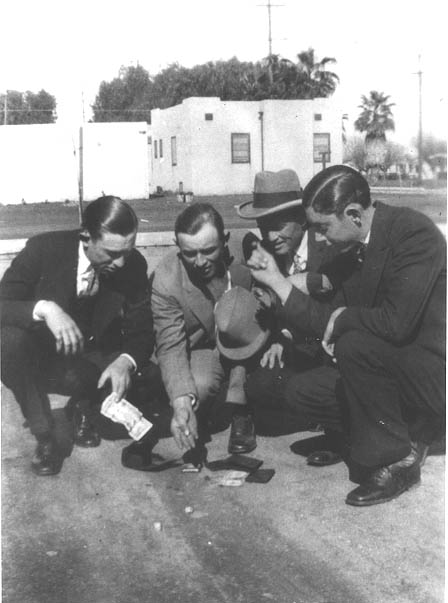 Texas-born brothers Hugh Farr, Glen Farr, and Karl Farr (along with their brother-in-law Billy Weir, wearing the hat), photographed in 1927 in Van Nuys, California. Hugh and Karl would later join Roy Rogers in the Sons of the Pioneers and record an obviously autobiographical fiddle tune called “The Texas Crapshooter”: Texas Crapshooter
Texas-born brothers Hugh Farr, Glen Farr, and Karl Farr (along with their brother-in-law Billy Weir, wearing the hat), photographed in 1927 in Van Nuys, California. Hugh and Karl would later join Roy Rogers in the Sons of the Pioneers and record an obviously autobiographical fiddle tune called “The Texas Crapshooter”: Texas Crapshooter
Clip from TR-873 in the Sons of the Pioneers Transcription Disc Collection.
Bluegrass Throwdown
 One of the great things about archives is that you can run across interesting information in places you’d never expect. For example, the Mike Seeger tape logs in the Southern Folklife Collection Field Notes (30025) are largely comprised of long lists of the song titles and performers which make up the track listings of his numerous field recordings. But hidden among the pages and pages of track listings are occasional gems of personal musings, background stories, or random anecdotes like the following:
One of the great things about archives is that you can run across interesting information in places you’d never expect. For example, the Mike Seeger tape logs in the Southern Folklife Collection Field Notes (30025) are largely comprised of long lists of the song titles and performers which make up the track listings of his numerous field recordings. But hidden among the pages and pages of track listings are occasional gems of personal musings, background stories, or random anecdotes like the following:
In August 1988, I spoke with Bud Reed about the Monroe Brothers engagement in the 1950s at the New River Ranch. . . He said that they booked them separately for the same day, then somehow they sang together on stage. . . Bud said that some of the public attended because of the widely circulated folklore that they had fought and broken up – and that the big scar on Charlie’s neck was from a knife wound from Bill. These people wanted to see them fight again. I’ve heard many such stories about these two.”
Listen below to a clip from the brothers’ (fratricide-free) collaboration that day:
Lonely Little Robin
The entire concert is recorded on SFC field tape FT-12917.
Jesse Rodgers, the Cousin of the Father of Country Music
When Jimmie Rodgers finally succumbed to tuberculosis on May 26, 1933, the world of country music was left without its founding father, and Victor records was left without one of its biggest stars. If an effort to fill the void, Victor quickly signed Jimmie’s cousin, Jesse Rodgers, to their Bluebird record label. Similarities between the two were emphasized, with rumors circulating that they had grown up in the same household (they hadn’t), and that Jimmie had taught Jesse to play the guitar (he probably didn’t). Sides were recorded with distinctly Jimmie Rodgers-esque titles (“Yodeling Railroad Blues”), and Jesse even signed his early promotional photographs with Jimmie’s trademark “Yodelingly Yours,”.
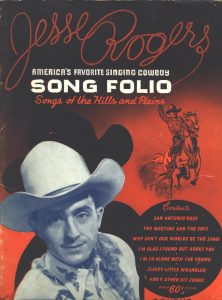
But as time wore on Jesse must have found the comparisons to Jimmie constricting, or perhaps waning commercial interest in Jimmie Rodgers imitators made them less desirable. He developed his own “singing cowboy” persona, and by 1938 had dropped the “d” from his last name in an effort to further distance himself from his cousin (and likely to associate himself with that other singing cowboy, Roy Rogers).
While he never came close to being the national star Jimmie was, the singing cowboy Jesse Rogers had a successful career as a featured performer on the WLS National Barn Dance in Chicago and on WFIL’s Hayloft Hoedown in Philadelphia (where he would go on to host the children’s television show Ranger Joe). His recording career continued into the early ’60s, when emphysema forced him to retire.
Listen below to clips from two of Jesse Rodgers’ 1934 Bluebird recordings, the heavily Jimmie Rodgers-influenced “San Antonio Blues”: SanAntonioBluesclip
And the cowboy song “Old Pinto, My Pony, My Pal”: OldPintoclip
(Both sound clips from SFC 78-828; 1946 Bourne Music Publishers song folio from the SFC Song Folios Collection.)
